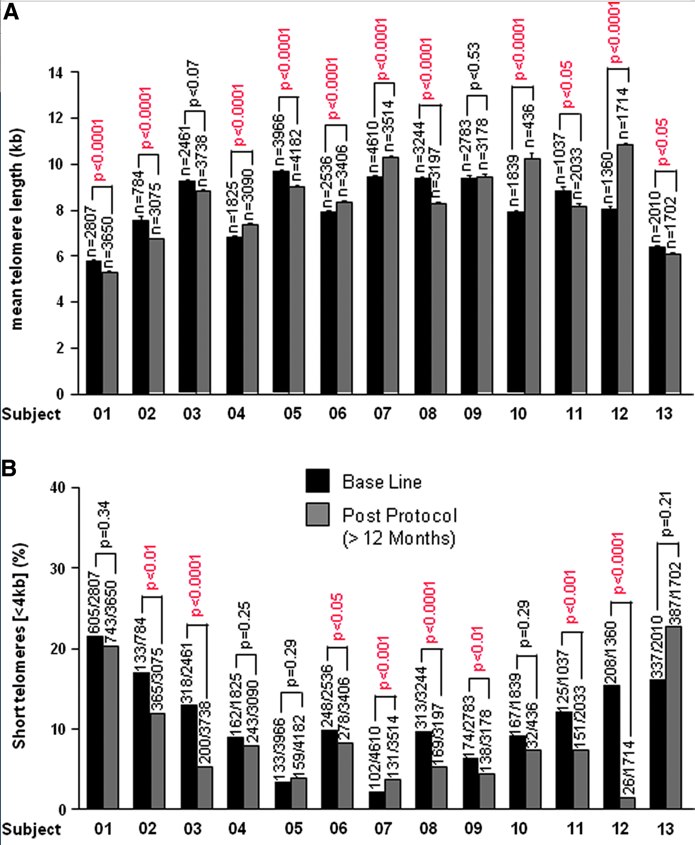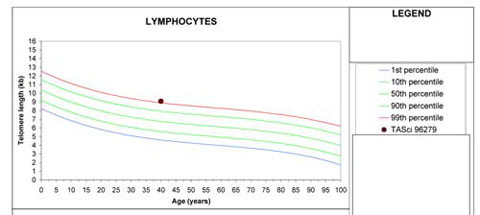
Astragalus, Astragaloside IV
#1951
Posted 04 June 2013 - 03:49 PM
#1952
Posted 05 June 2013 - 09:50 AM
#1953
Posted 05 June 2013 - 12:11 PM
I just get my bottle of TA65. I will test everything by next week.
The best telomere test is also the cheapest and easiest. It's new saliva-based technology from Telome.com. The thing that makes it better is that it tells you the fraction of critically short telomeres, not just the average length. Telomerase doesn't act efficiently on telomeres that are longer than the critical length, so you can't tell if the therapy is working by looking at averages. Telome's "premium" test is the one that give you this information. It's 299 USD. Quantity discounts are available. Preston Estep, one of the company's founders, did a podcast here recently. I wonder if he would do a deal with us if we were to round up some Longecity people to get a batch of tests?
sponsored ad
#1954
Posted 06 June 2013 - 07:01 PM
#1955
Posted 06 June 2013 - 07:19 PM
#1956
Posted 06 June 2013 - 08:59 PM
#1957
Posted 06 June 2013 - 11:06 PM
#1958
Posted 07 June 2013 - 03:22 AM
I just get my bottle of TA65. I will test everything by next week.
The best telomere test is also the cheapest and easiest. It's new saliva-based technology from Telome.com. The thing that makes it better is that it tells you the fraction of critically short telomeres, not just the average length. Telomerase doesn't act efficiently on telomeres that are longer than the critical length, so you can't tell if the therapy is working by looking at averages. Telome's "premium" test is the one that give you this information. It's 299 USD. Quantity discounts are available. Preston Estep, one of the company's founders, did a podcast here recently. I wonder if he would do a deal with us if we were to round up some Longecity people to get a batch of tests?
are these salilva measurements also based on T-Cells like the blood tests? It would be cool to to have a measurement of hair and skin cells to verify Cycloastragenol is effective on all groups of cells.
Edited by marcobjj, 07 June 2013 - 03:25 AM.
#1959
Posted 15 June 2013 - 04:19 PM
I just get my bottle of TA65. I will test everything by next week.
... Telome's "premium" test is the one that give you this information. It's 299 USD. Quantity discounts are available. Preston Estep, one of the company's founders, did a podcast here recently. I wonder if he would do a deal with us if we were to round up some Longecity people to get a batch of tests?
I'd be interested too. Only reason I didn't jump on their previous promotion was the delay between the sign-up/ordering date and the actual processing date which seemed somewhat vague and possibly scheduled to occur sometime in the Summer... seems to me that the best time for submitting saliva samples would be anytime except the Summer when they might degrade in transit. Unless you go directly to their processing location yourself. If he does another podcast that might be something to ask him about.
Howard
#1960
Posted 15 June 2013 - 10:31 PM
are these salilva measurements also based on T-Cells like the blood tests? It would be cool to to have a measurement of hair and skin cells to verify Cycloastragenol is effective on all groups of cells.
Here's the relevant section from the FAQ at the Telome site:
Q: Is saliva as good as blood for testing telomeres? What is the source of DNA in saliva?
Yes! Saliva is generally equivalent to blood. In fact, DNA in saliva is actually derived from blood! In a surprising and serendipitous discovery scientists recently found that people who have received bone marrow transplants bear the genes of the donor in both their blood and their saliva, but not in other cells! In another publication in Nature Communications, it was shown that telomeres shorten at equivalent rates in the somatic tissues of adults. Therefore, saliva telomere length is a reliable indicator of telomere length generally throughout the body. The one complication in using saliva to measure telomeres is that saliva contains DNA from bacteria and other microbes. Our suite of collection, processing, and analysis technologies enable us to collect samples by mail and courier, then extract and test purified DNA directly from saliva, without interference from microbial DNA—and without needles!
#1961
Posted 21 June 2013 - 04:56 PM
These are amazing results by Dr. Park, 1400bp (mean) in 4 years, i.e. 350bp/year (mean), an increase about 4 times more than what you lose during a year. And he states he didn't take supplements or hormones. To me that looks a bit too good to be true and very simplistic. The scans are very low resolution and he is running the first anti-aging clinic based on TA65. Also I noticed that the absolute value from 2012 (9800bp) is well within the range a 44 year old can expect, I've seen a measurement that even a hundred year old can have such long telomers: http://www.pnas.org/...00/F3.large.jpg , I don't think the method of measurement changes the outcome. The site doesn't even state whether he is following the Patton protocol (there's a section on that) or if he takes TA65 continuously without breaks (well, somehow it's implied).There're only so many substances which can differ between TA65 and HTA/HTA98 if they are extracted "only" from Astragalus Membranaceus.
But let's assume that HTA is HTA98 and that it consist of 98% Cycloastragenol (5mg or 10 mg) and then "random substances which we didn't manage to filter away". Then the poor results according to this report would indicate that Cycloastragenol would need some help of the other substances available in the plant in order to be more effective. This would also be in line with the mediocre "almost +/-0 results" I got when using Cycloastragenol, 5 mg for six months without anything else added than Chitosan, 1 mg. Which obviously did not boost the effect of the Cycloastragenol.
Let's then assume that TA65 is only 5% Cycloastragenol and then "ordinary Astragalus extract which we kept in order to have some other stuff in the pill". Then this report would indicate this to be a more effecient mix of ingridients.This is of course only speculation, the other 95% could be standardized on some specific subset of the plants other substances, but might in any case suggest you shouldn't use pure Cycloastragenol when it's not as effective. You might want to complement it with some other Astragalus extract of some kind.
Well, what I think was going on with you is that 5mg of cycloastragenol just wasn't enough. When you took a larger dose of a mixed astragalus extract, the cycloastragenol was synthesized (microbially in the gut of metabolically) from other astrogalosides (all that's needed is a simple enzymatic cleavage, so this is not unlikely) and you effectively got a larger dose of cycloastragenol.
I don't think we should assume that HTA is the same as HTA98, because in the paper they say that HTA is a mixed product, while Tony Mackenzie says that HTA98 is cycloastragenol. The "98" was probably tacked on to the name to distinguish it from an earlier HTA product. We really need Anthony to sort this out.
It is also very possible that Cycloastragenol did work for you, by decreasing the number of critically short telomeres. The number of critically short telomeres is thought to be more important data then mean telomere length.
- when Bill Andrews tested TA65 with 12 subjects over the course of a year, he found that mean telomere length did still decrease, however the number of critically short telomeres also decreased. (source: http://www.youtube.com/watch?v=-bmMv6dcsgE)
-Dr Ed Park measured his telomeres regularly and found that both his mean telomere length and critically short telomeres decreased in the first 6 months. After that his critically short telomeres continued to decrease, but his mean telomere length went up. After years of taking TA65 his mean telomere length is that of an 18 year old according to tests. (source: http://www.rechargeb...ark.php?page=41)
Any other thoughts? Or more detailed reports from Dr Park or other individuals?
#1962
Posted 22 June 2013 - 12:16 AM
Edited by marcobjj, 22 June 2013 - 12:36 AM.
#1963
Posted 22 June 2013 - 04:54 PM
Edited by solarfingers, 22 June 2013 - 05:29 PM.
#1964
Posted 22 June 2013 - 05:25 PM
The root powder of the herb; more nutrients, more of everything, carbs, protein, but less ratio of certain compounds. It will be a tad bit of a different effect. I've always used the extracts, minus a few times.
From this thread:
Remember guys:
The difference is that regular astragalus does not usually have a high amount of Astragaloside IV. Here are the amounts of astragalus and the amount of astragaloside iv contained in these amounts:
If we calculate astragaloside iv amount in these astragulus dosages it is interesting that there is not very much in it:
9 grams of Astragalus = 14.4mg of Astragaloside IV
15 grams of Astragalus = 24mg of Astragaloside IV
30 grams of Astragalus = 48mg of Astragaloside IV
60 grams of Astragalus = 96mg of Astragaloside IV
120 grams of Astragalus = 192mg of Astragaloside IV
I just wanted to make sure you guys are taking enough Astragalus to make a difference.
Cheers
A
Anthony is a vendor of Astragaloside IV. I believe he knows what he is talking about. This information does not help him sell his product so I give him an authoritative rating of 9 out of 10 on this one.
James Green also supports taking raw Astragalus powder and says it can be taken alone to lengthen telomeres.
* Note that I take 45g a day not 45mg. That was a typo.
Edited by solarfingers, 22 June 2013 - 05:30 PM.
#1965
Posted 23 June 2013 - 03:58 PM
I'm interested in this for two reasons. First, Dr. Park's median telomere length has increased over a significant period of time (several years) rather than decreased, giving us at least one sample of telomere lengthening to assess what happens when median telomere lengths increase in humans over time, as opposed to decreasing. Second, Dr. Park already had relatively long telomeres in 2007, so this doesn't appear to me to be compensatory lengthening of relatively short telomeres. I think it's significant because it appears that Dr. Park's already-long telomeres were lengthened even further.
The next question would be: what's happened to the median length of Dr. Park's telomeres since January, 2012? Have they continued to extend?
Dr. Park has given two examples of telomere lengthening in his patients in his emailed newsletter. One of these is Bill Harris. To quote Dr. Park:
- Bill Harris started TA-65 at the age of 77 with a telomere length of 4100 base pairs.
- After two years of full dose, at the age of 79, he now measures 5500 base pairs.
- If we assume 100 base pairs of telomere erosion per year and the two years of aging, he measures 16 years younger than when he started!!
Note that with a sample size of 1, I can't know whether TA-65 was responsible for this dramatic median telomere extension, or whether something else was the prime mover. Note also that Mr. Harris median telomere length was below average for his age, and that two years later, it had risen to average for his age.
The second example is that of "Brian M.". His story is summarized in the linked chart. His median telomere length went from 5,760 base pairs to 7,443 base pairs over a period of 16 months. This represents an increase of approximately 1,700 base pairs over a 16-month period. At age 66, the median telomere length for the average Joe is slightly less than 6,000 base pairs, so Brian M's starting point was slightly below the average 66-year-old's median telomere length. His endpoint after taking a total of something like 2,468 TA-65 capsules apparently places him in the 82nd percentile among 68-year-olds. From a shortest-telomere standpoint, he apparently reduced his "shortest telomere age" by 14 years.
Dr. Park is measuring physiological age changes at his Recharge Biomedical Clinic, which should provide some quantitative measure of the effects of TA-65.
I'd personally like to see the result of a prospective study (it wouldn't have to be placebo-controlled) following a specific set of patients for a year or two.
#1966
Posted 23 June 2013 - 04:11 PM
#1967
Posted 23 June 2013 - 11:16 PM
OOPs! It looks as though, with the aid of the "find and replace" tool, I coined the new word, "mediand", in my last post. That word should have been "measured". Sorry.
on the video that I embedded on post 1962, the study showed that half of the 12 subjects experienced increase in mean telomere length taking TA65 for an year. 10 out of 12 subjects experienced a decrease in percentage of short telomeres:

full paper at:
http://www.agemed.or...US/Default.aspx
Edited by marcobjj, 23 June 2013 - 11:19 PM.
#1968
Posted 24 June 2013 - 03:31 AM
That is a very interesting study AMM has performed. In the end they state there is some kind of dose-response correlation but don't elaborate, so it is unlikely this is clear cut. I could see a number of factors that could play a role for negative outcome in some individuals, doesn't mean the drug isn't working in general. That is not unusual in a clinical study.
It's interesting to see how patient 12 responded well in both categories, average and shortest telomers, and patient 10 did well with average, but only slight improvement for shortest telomers. Patient two and three had good improvements with shortest telomers but even lost average length. So average and shortest telomers are almost independent biomarkers in some patients. The efficacy of the Patton protocol was shown with success in 5 of 13 patients for shortest telomers (the other are more or less unchanged or worsened), two out of 13 had a remarkable response with respect to the average length.
#1969
Posted 24 June 2013 - 04:20 AM
#1970
Posted 24 June 2013 - 06:55 AM
Educated answers really appreciated as I'm eager to try this supplement out.
Edited by piet3r, 24 June 2013 - 06:56 AM.
#1971
Posted 24 June 2013 - 01:18 PM
To answer piet3ers question: probably not according to the preliminary studies, if you are 26 years old and your telomers are tested 8-9kbp, better put your money towards retaining that length, excercise a sport that doesn't ruin your body, eat healthy, avoid accidents and infections, stress and depression.
Edited by DorianGrey, 24 June 2013 - 01:20 PM.
#1972
Posted 24 June 2013 - 11:42 PM

pietr3 unless you have a ton of disposable income I'd wait until I'm 30 to begin and just focus on healthy living like DorianGrey said. Also supplement fish oil with high DHA/EPA and a good multivitamin.
#1973
Posted 24 June 2013 - 11:45 PM
#1974
Posted 24 June 2013 - 11:50 PM
Edited by marcobjj, 24 June 2013 - 11:51 PM.
#1975
Posted 25 June 2013 - 01:28 AM
#1976
Posted 25 June 2013 - 06:19 AM
#1977
Posted 25 June 2013 - 12:03 PM
#1978
Posted 25 June 2013 - 03:31 PM
From the n=13 study I guess one can conclude that with the test for average they used, 9 to 10kb is a good target for average length, below 8kb it may be a good idea to try TA-65 like supplements AND/OR if you have between 5-15% short telomers <4kb. If you got <5%, any benefit that can be measured is very borderline, you are on target already. If you got >15%, you probably got enough health issues already that will prevent you from recovering telomer length with a normal levels of supplementation.
I find the information from the study very useful, also the part in the study on CMV+ and CMV- patients is interesting. That infection really seems to burn through some immune cells. Is there a simple, private test for cytomegalovirus?
Edited by DorianGrey, 25 June 2013 - 03:34 PM.
#1979
Posted 25 June 2013 - 07:02 PM
Edited by marcobjj, 25 June 2013 - 07:29 PM.
#1980
Posted 28 June 2013 - 07:27 PM
6 user(s) are reading this topic
0 members, 6 guests, 0 anonymous users






























 This topic is locked
This topic is locked



















